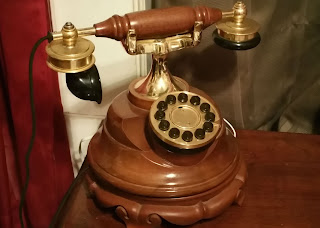 |
| The Signal between parents and teens is at least as old as the invention of the phone. |
What is new is the technology used to implement the system, which I like to call The Signal.
How it works
Basically, parents create an understanding, whether through a texted code, such as the "x" used in the post, or a word or conversation that signals the parent to do two things.
1. Immediately rescue the teen from an uncomfortable or unsafe situation.
2. Spare the child grief or embarrassment among his or her peers by shifting the blame to the parents.
1. Immediately rescue the teen from an uncomfortable or unsafe situation.
2. Spare the child grief or embarrassment among his or her peers by shifting the blame to the parents.
The system works because teens have an innate need to roll their eyes and declare, "I can't. My dumb parent's won't let me."
Why it works
The system is brilliant because it fosters open communication and a sense of camaraderie between parents and their teens.
It's critical because it gives teens an escape route for situations in which they feel threatened, unsafe, uncomfortable or simply dislike.
It's critical because it gives teens an escape route for situations in which they feel threatened, unsafe, uncomfortable or simply dislike.
Yes, disliking an activity and feeling bored are perfectly good reasons to initiate The Signal system. That's part of the agreement and a key to making it work — the teen is allowed to use The Signal system for any reason.
Once the parent receives the agreed upon signal, the parent must intervene and take the heat. It's a promise the teen will come to depend on and appreciate.
Once the parent receives the agreed upon signal, the parent must intervene and take the heat. It's a promise the teen will come to depend on and appreciate.
Historical proof
My siblings and I had a similar arrangement with my parents when we were teens, well before cell phones. We'd just tell our peers we had to check in — call home from the hosts phone or a pay phone. While an initial check-in call was made to assure our parents we'd arrived safely, an additional check-in call immediately signaled to Mom that we needed to be rescued.
Mom made it clear that she was always happy to take the blame if we needed an out. We always carried a quarter with us in case we needed to use a pay phone. We even had a plan for making collect calls if we lost or forgot the quarter. As a teen, I loved knowing I could use my parent's as scapegoats.
When my mom was a young girl growing up in New York City, she carried a dime with her. Hubby and I used the Signal system with our boys, as well. They carried 45 cents until they were old enough for cell phones.
I'm glad The Signal is catching on. It truly is an excellent safety net. I know, because I'm 100 percent sure it is an old, tried and true system that dates back to at least the early 1950s.
Micki Bare, mother of three, wife, daughter & writer is the author of Thurston T. Turtle children's books and aspiring novelist.
Micki Bare, mother of three, wife, daughter & writer is the author of Thurston T. Turtle children's books and aspiring novelist.
Email: mickibare (at) gmail.com
Connect with Micki on Google+
Like Thurston T. Turtle on Facebook
Follow Micki on Twitter: @TurtleAuthor
View Micki's pics on Instagram @mickibare
Chat with micki_bare on SnapChat
Writing Samples
View Micki's pics on Instagram @mickibare
Chat with micki_bare on SnapChat
Writing Samples
Copyright 2017 Michele Bare
This comment has been removed by a blog administrator.
ReplyDeleteThis comment has been removed by a blog administrator.
ReplyDelete